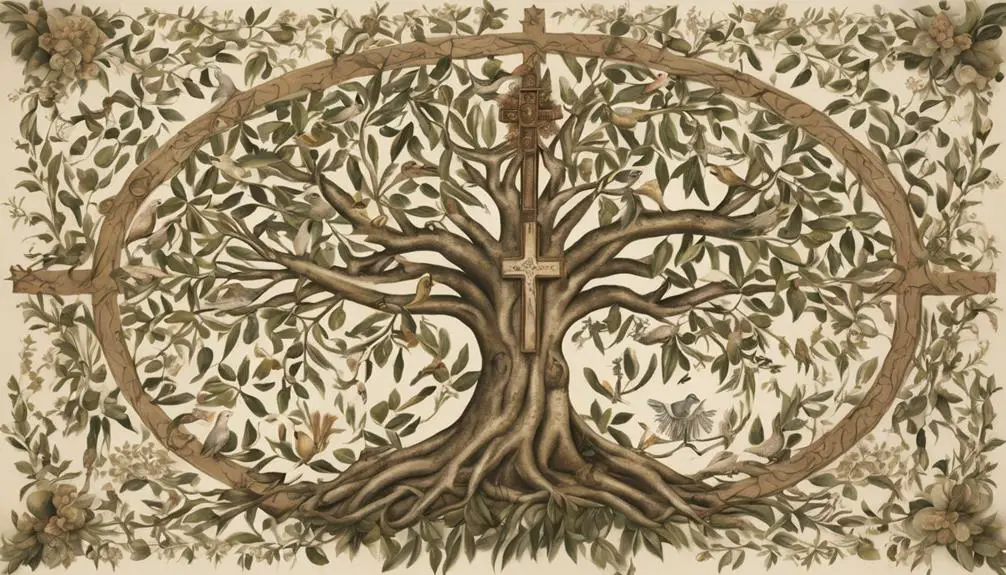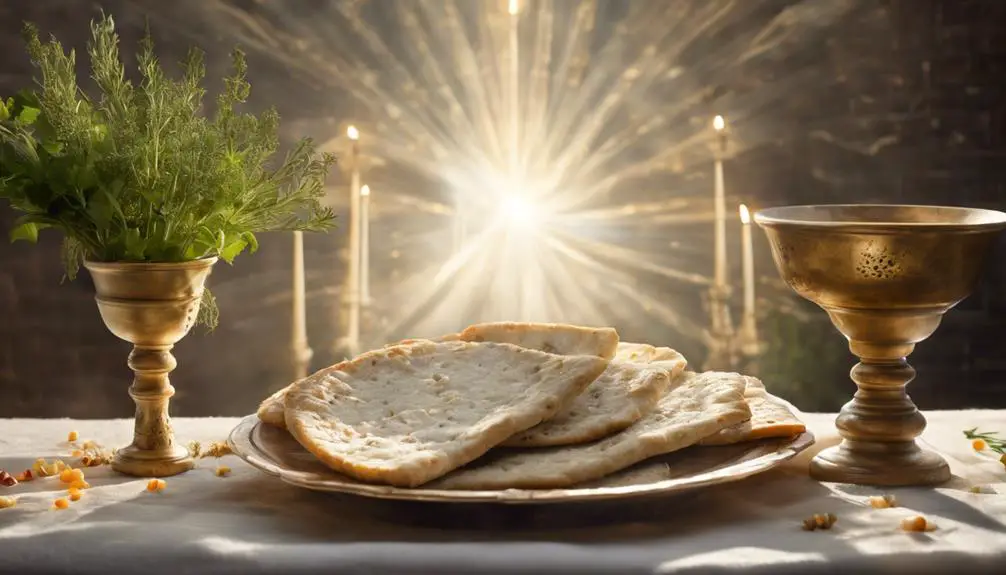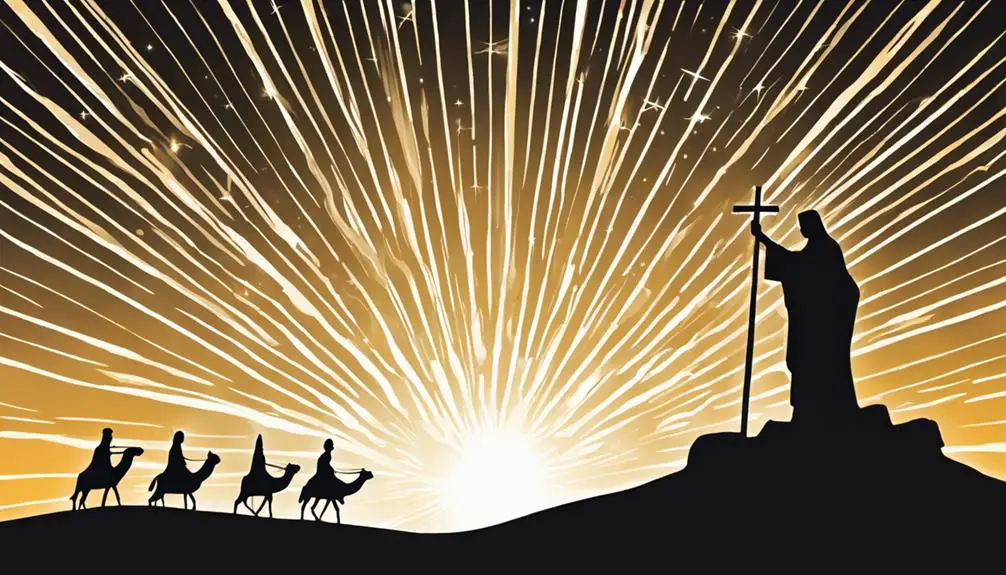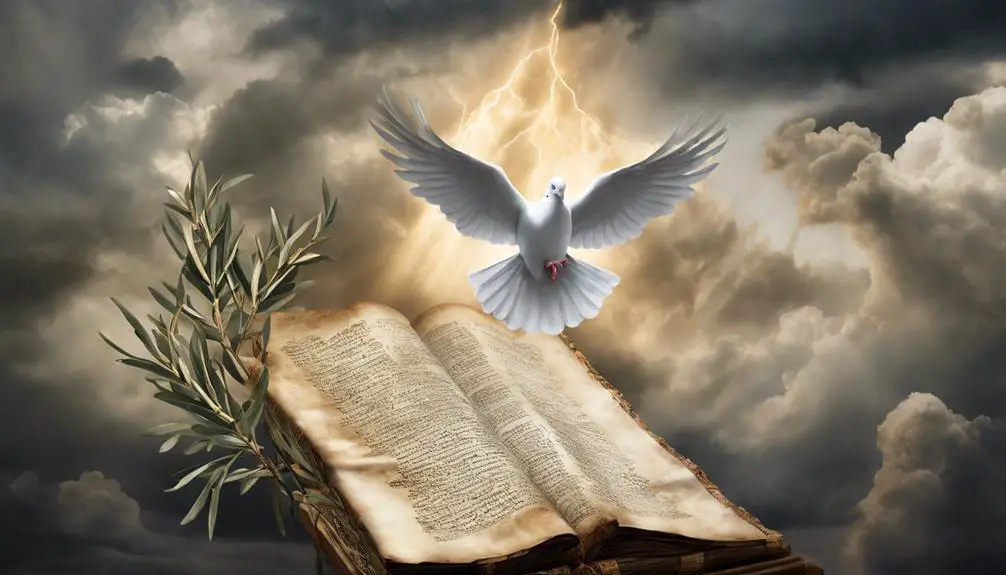A deep dive into the biblical significance of the number 14 reveals layers of history and prophecy, beckoning for further exploration.

The Meaning of 14 in the Bible
Navigating the biblical landscape, you'll find the number 14 stands as a beacon of genealogical and prophetic significance, much like a lighthouse guiding ships through the night.
It's woven into the fabric of Passover preparations, marks the lineage of kings, and connects deeply to the ancestry and birth of Jesus.
As you explore its multifaceted roles—from David's kingship to its symbolism in prophecy—you're stepping into a rich tapestry of history and meaning that beckons for a closer look.
Unraveling these threads may just shed new light on familiar stories, inviting you to contemplate its significance in a broader context.
Key Takeaways
- The number 14 represents completeness and God's providential arrangements, as seen in Jesus' genealogy.
- It signifies purity and preparation, marking the day of Passover with sacrificial and cleansing rituals.
- David's kingship, connected to the number 14, symbolizes spiritual renewal and divine alignment.
- In biblical prophecy, 14 enriches narratives with deep symbolic meanings, emphasizing divine truths and redemption.
Genealogical Significance

In analyzing the genealogical significance of the number 14 in the Bible, it's evident that this numeral holds substantial symbolic weight, particularly in the context of lineage and heritage. You'll find that in the intricate numerical patterns woven throughout the biblical narrative, 14 stands out, especially in the genealogy of Jesus as recorded in the Gospel of Matthew. Here, the lineage from Abraham to David, from David to the Babylonian exile, and then to the Christ, is deliberately divided into three sets of 14 generations.
This deliberate structuring isn't merely for historical recounting; it serves a deeper, symbolic purpose, reflecting a perfect span of time and emphasizing completeness and God's providential arrangements within cultural contexts. The use of 14, therefore, isn't arbitrary. It's deeply embedded in the Jewish numerology and cultural significance of numbers, where every numeral holds specific connotations and implications.
Understanding this, you grasp that the biblical authors didn't just record events and genealogies; they meticulously crafted narratives that conveyed theological truths, moral imperatives, and divine promises, all while deeply intertwined with the cultural and numerical significance of their time.
Passover and Preparation

Delving into the significance of the number 14 further, its symbolic presence is vividly highlighted in the observance of Passover and the meticulous preparations that accompany it. This period, deeply rooted in the Jewish tradition, aligns with the lunar calendar, marking a time of reflection and liberation.
Here's how the number 14 plays a pivotal role in Passover and its preparation:
- Date Selection: Passover begins on the 14th day of Nisan, as per the lunar calendar. This timing ensures the observance occurs under a full moon, symbolizing renewal and enlightenment.
- Sacrificial Lamb: The selection of the sacrificial lamb occurs on the 14th, a critical element of Passover. This lamb, symbolizing purity and sacrifice, is central to the Passover meal, commemorating the Israelites' liberation.
- Preparation Rituals: On the 14th, families engage in thorough cleaning, removing all leaven from their homes. This act symbolizes the removal of pride and moral impurity.
- Spiritual Reflection: The timing encourages introspection and communal preparation, strengthening bonds and faith through shared rituals.
Understanding these elements highlights the intricate ways in which the number 14 influences Passover, intertwining lunar cycles, sacrifice, and spiritual purification in a rich tapestry of tradition and symbolism.
David and Kingship

Reflecting on the symbolic significance of the number 14 in Passover reveals a pattern of redemption and renewal, themes that also resonate deeply in the narrative of David's ascendancy to kingship. This period in Biblical history isn't just about a change in leadership; it's a profound transformation in the embodiment of faith and governance. David's valor, a key aspect of his character, contrasts sharply with Saul's leadership.
While Saul's reign is marked by disobedience and a gradual loss of divine favor, David's journey to kingship is underscored by his steadfast faith and bravery. His valor isn't merely physical but also spiritual, showing a deep commitment to the principles that the number 14 symbolizes. David's battles, both literal and metaphorical, reflect a journey of renewal, as he overcomes giants not just on the battlefield but also in the spiritual realm.
Saul's contrast with David highlights a pivotal shift from a kingship that has lost its way to one that seeks to align more closely with divine will. This transition isn't just political but deeply spiritual, reflecting a cycle of redemption and renewal that the number 14 encapsulates within the biblical narrative.
Jesus' Ancestry and Birth

The genealogy of Jesus, as recorded in the Gospel of Matthew, notably incorporates the number 14 to underscore a divine pattern of historical and spiritual significance, connecting His birth to a legacy of redemption. This meticulously structured lineage not only reaffirms Jesus' rightful place in the Davidic line but also prepares the reader for the fulfillment of Old Testament prophecies through His virgin birth and humble arrival in a Bethlehem stable.
To fully appreciate the depth of this connection, consider the following points:
- The Structured Genealogy: Matthew's genealogy is divided into three sets of 14 generations, emphasizing God's deliberate design in history leading to the Messiah.
- Significance of David: The number 14, being numerically linked to David, highlights Jesus' rightful claim to David's throne and His role as the eternal King.
- Virgin Birth: This miraculous event, foretold by prophets, affirms Jesus' divine origin and His unique role in God's plan of salvation.
- Bethlehem Stable: The humble circumstances of Jesus' birth contrast with His royal lineage, symbolizing His mission to serve and redeem the lowly and lost.
Analyzing these elements reveals the intricate weaving of divine purpose through Jesus' ancestry and birth, highlighting the profound spiritual journey from prophecy to fulfillment.
Symbolism in Prophecy

Within biblical prophecy, symbols serve as powerful conduits for divine truths, offering layers of meaning that invite you to unravel the mysteries contained within sacred texts. Beast imagery and apocalyptic visions, in particular, stand out as profound elements that encapsulate the struggle between good and evil, often presenting a complex narrative that demands your intellectual and spiritual engagement.
Beast imagery, for instance, isn't just about the fearsome creatures it portrays; it's a mirror to the societal, political, and spiritual corruption of the times. These symbols aren't arbitrary; they're meticulously chosen to communicate the depth of depravity and the eventual triumph of righteousness. As you delve deeper, you'll find that these apocalyptic visions serve not only as warnings but also as a promise of redemption and the restoration of divine order.
Moreover, the use of numbers, colors, and other motifs in prophecy enriches the tapestry of biblical narrative, making every element a clue to understanding the divine message. The challenge and beauty of interpreting these symbols lie in their ability to transcend the literal, leading you to a more profound comprehension of spiritual truths. Through this analytical journey, you're invited to explore the multifaceted nature of prophecy, where every symbol opens a door to deeper insight and reflection.
Frequently Asked Questions
How Is the Number 14 Linked to the Concept of Forgiveness and Redemption in the Bible?
You're exploring how the number 14 connects to forgiveness and redemption. It symbolizes generational cycles and Divine government, emphasizing completion and renewal.
This number's biblical appearances often highlight God's mercy and the restructuring of broken relationships. Through these narratives, you see a pattern where 14 acts as a marker of God's intervention to guide and restore.
It's a profound reminder that forgiveness and redemption are central to divine order and human experience.
Are There Any Significant Events in the Bible That Specifically Occurred on the 14th Day of a Month, Outside of the Passover Context?
You're diving deep, exploring beyond Passover's shadow to uncover events on the 14th day of a month.
Interestingly, the Bible isn't just about feasts and purification rituals tied to this date. Analyzing its pages, you'll find the Day of Atonement and the Feast of Tabernacles, among others, don't specifically align with the 14th.
This insight challenges common perceptions, inviting a scholarly reevaluation of biblical dates and their significance.
How Does the Number 14 Relate to the Structure or Composition of the Bible Itself, Such as the Organization of Books, Chapters, or Verses?
You're diving into the intricate world of biblical numerology, exploring how the number 14 relates to the Bible's structure. This number isn't just a figure; it holds genealogical significance and mirrors numerical patterns within the text.
For instance, the Gospel of Matthew organizes Jesus' genealogy into three sets of 14 generations, underscoring its deep symbolic resonance. This pattern isn't coincidental but a deliberate choice, reflecting the text's layered and complex composition.
In Biblical Numerology, How Does the Number 14 Compare or Contrast to Other Significant Numbers Like 7, 12, or 40 in Terms of Its Meaning and Implications?
You're diving into numerical symbolism, exploring how 14 stacks up against 7, 12, or 40.
In this realm, 14 signifies generational cycles, a doubling of seven's perfection and completion.
It contrasts with 12's representation of divine governance and 40's theme of trial and testing.
Analytically, 14's linkage to generations offers unique insights, weaving a tapestry of continuity and fulfillment within biblical narrative, distinct yet harmoniously aligned with other symbolic numbers.
Can the Number 14 Be Connected to Any Particular Biblical Figures or Stories Not Directly Related to Jesus, David, or the Passover Events?
You're diving into whether the number 14 connects to biblical figures or stories beyond Jesus, David, or Passover.
Interestingly, it doesn't directly link to Jacob's journey or Solomon's wisdom in a straightforward manner. However, an analytical look might reveal patterns or symbolic uses in texts related to these figures, offering insight into the subtle ways numbers like 14 play a role in biblical narratives and the deeper meanings they might hold.
Conclusion
In conclusion, the number 14 isn't just a number in the Bible; it's a cosmic powerhouse, weaving through generations and prophecies with the finesse of a celestial choreographer. It's the backbone of biblical genealogy, the heartbeat of Passover, and the cornerstone of kingship.
Through Jesus' ancestry, it emerges not merely as a number but as a divine signature, echoing through the ages. In the realm of biblical symbolism, 14 is nothing short of a celestial phenomenon, embodying layers of meaning that offer profound insights into the divine narrative.



Sign up